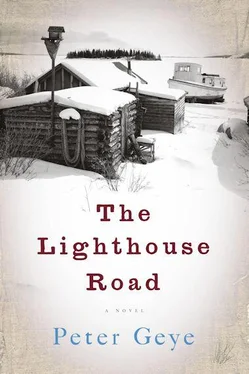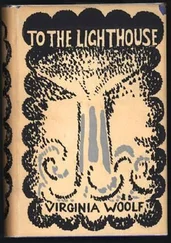For four dreamlike days and sleepless nights this continued, the child never really at rest, until the fifth day, when she felt first a tingling and then a weightlessness in her breasts and the nursings that had once lasted an hour lasted fifteen minutes, after which Odd fell into an engorged sleep. Her happiness in those hours, with the contented boy in her arms, was her new religion, their communion her new salvation.
Sitting in her bed under the window, looking out over the isthmus that separated the harbor below her and the cove to the north, looking out over the great lake and her shimmering waters, she thought often of who she used to be. It seemed, in those sleep-deprived daydreams, with her boy on her lap, that the travails of the last year were trifles beside her feelings for Odd. He was her reward for the loneliness she'd endured. This thought filled her with peace. She saw the distance between Hammerfest and Gunflint as the way to this peace and so her regrets and misgivings dissolved in the warmth between them.
Though the look back was clear, the one ahead was dark as the devil's lair, and thoughts of the easiness of her love inevitably gave way to worries about what would come in that darkness. She had every cent she'd made at the Burnt Wood Camp saved in her purse. Seventy-five dollars in all, though what it amounted to she had no idea. She'd been told that returning to the camp on the Burnt Wood was not possible. She would have known it without having been told. She knew finding a husband would be nearly impossible now, too. She knew, finally, that she could no sooner return to Hammerfest than resurrect her childhood. It was as though the way back had been swallowed by the wakes of the boats that had brought her.
Hosea's generosity had saved her more than once, but she knew she could not live with him forever. She would not ask for so much. She'd shift her view from the water to the buildings on the Lighthouse Road. Perhaps she could become a shop girl. Or a cook at the Traveler's Hotel. Perhaps she could even work for Hosea, alongside Rebekah. But where would she live? And how could she take care of her boy while she did any of these things? This last was the question furthest from an answer, the one that cast the darkest pall on her days ahead. It was also the question on which she inevitably turned her thoughts.
She wrote letters to her mother and father, not from a sense of duty but because it spared her any reckoning with the future. Instead of giving them to Hosea to post she folded them and stacked them on the bedside table. She read her Bible without deliberation. She tried to sleep but couldn't. Her days and nights bleeding into each other, her mind wrestling itself, her only clear thoughts arriving when she studied her boy.
His eyes were not often open, but when she caught their glint she marveled at their blueness. In the daylight they were almost transparent, the color of cold, cold snow. At night, with only the bedside lamp glowing, his eyes looked fathomless and dark. She always wished to see them, so she'd feather his full hair back from his forehead. When he did not stir, she'd bend her lips to his face and kiss each of his sleeping eyes. She'd feel her own eyes glossing over with the tears that came at will and without her even knowing.
When his eyes opened he'd search for her and look intently at her as she'd say, " You're my beautiful boy." Her voice would send him back into his blessed sleep. What had he seen, looking up at her? And why could she not stop weeping, with all her joy?
Hosea had begun to wonder the same thing. He'd cosseted her from the hour of Odd's birth, stopping in her bedroom every morning before he went down to the shop and again each evening before dinner. He'd check her abdomen and feel her forehead and then switch his attention to the babe.
"How's the wee lad this morning?" Hosea might say, not expecting an answer.
Thea would not even look up.
"Dear me," Hosea would say, checking the boy's forehead. "I'm worried about you, Thea."
Down in the shop, during the late-morning lulls, he was consulting Burton's A natomy of Melancholy and Charles Daniel Fox's Psycho pathology of Hysteria. He'd made a preliminary diagnosis of postpartum melancholia but knew such a diagnosis wasn't complete. There was no question she cried often, almost incessantly. She talked to herself, he knew from passing her room, and she seemed to have no eagerness to rejoin him and Rebekah at table or in ordinary conversation. She was overly protective of the boy, seemed paranoid, was even twitchy at times. Yet despite these symptoms, he was mystified by what he could only think of as an aura. Though she'd always seemed, in some way or another, angelic, in those first days after Odd was born she literally had a sheen about her, a radiance that as much as lightened the air around her.
When two weeks passed with no change in her aspect— two weeks he'd spent immersed in his books, mulling options for her cure — he decided something had to be done. Before he went downstairs to open the shop he stopped in to Thea's room.
"Good morning, Thea."
She adjusted Odd's cap.
Hosea thumbed the wee boy's little toes, spoke his baby gibberish, then stood up and looked down at Thea. In his clumsy Norwegian he said, "Has two weeks of rest given you your strength back?"
Thea did not answer.
He continued in Norwegian, "You've hardly spoken at all since the child was born. Are you feeling well? Are you happy?"
She turned her attention back to the child, touched his face gently, then looked back at Hosea. "Very happy," she said.
Hosea stepped forward and knelt at her bedside. He put his hand on her arm. "Join Rebekah and me at supper tonight."
Thea nodded, smiled.
"Very good!" Hosea said in English now. "Rebekah will prepare a feast."
And she did, fish soup and buttermilk biscuits, apple strudel for
dessert. Thea came to the table for supper with Odd in her arms. She appeared sleep-starved and nervous, and when Rebekah asked— as she'd been instructed to — if she could hold the boy, Thea shook her head and held him closer.
"Now, Thea, you can't hold him forever," Hosea said in Norwegian, his voice jolly, his line rehearsed. "Rebekah wants a turn with the little one."
"Sleepy," Thea said in English. "Odd. Sleepy."
"Okay, child," Hosea said, his tone full of sympathy.
By the time Rebekah served the strudel, the boy was indeed asleep. Thea held him close while she nibbled on the baked apples, tending constantly to the blanket wrapped around him, to the knit hat he wore on his head.
"I've got something for Odd," Hosea said, setting his empty coffee cup on the saucer. He stood and wiped his mouth with the napkin off his lap. He went into his bedroom and returned a moment later lugging a birch-wood bassinet. He set it down next to Thea. "A place for the boy to sleep," he said, rearranging the muslin canopy. There was a scalloped skirt hanging under the ticking.
Thea leaned forward, looked into the bassinet, at the plush bedding. She looked doubtful, seemed to be holding the boy closer.
Hosea did not hold much hope she would put the child to bed properly. "You must get some rest. Your humors are not well." And with those words Hosea left Thea and the boy at the table, carried the bassinet across the flat.

R ebekah stayed up late that night. She trimmed the apothecary with holly and mistletoe, with candles in all the windows and a ten-foot spruce covered in tinsel and strung cranberries. When she came upstairs after midnight Thea was changing Odd's diaper. He was fussing, sending up his little howls, punching the air with his balled fists. After Thea finished wrapping his bottom and straightening his layette she lifted him and started to sing.
Читать дальше













